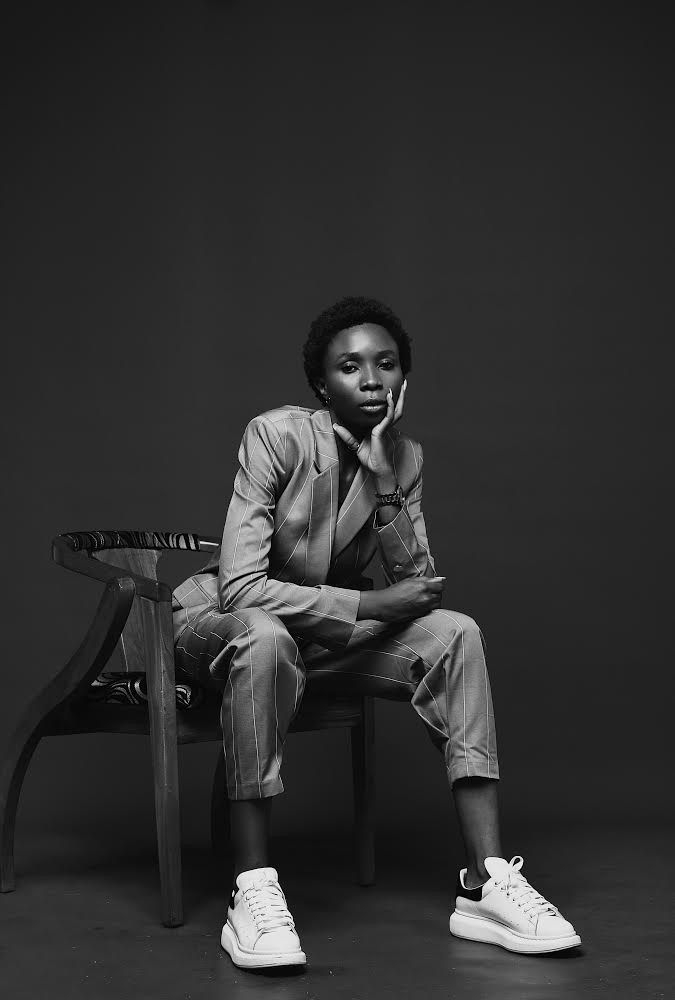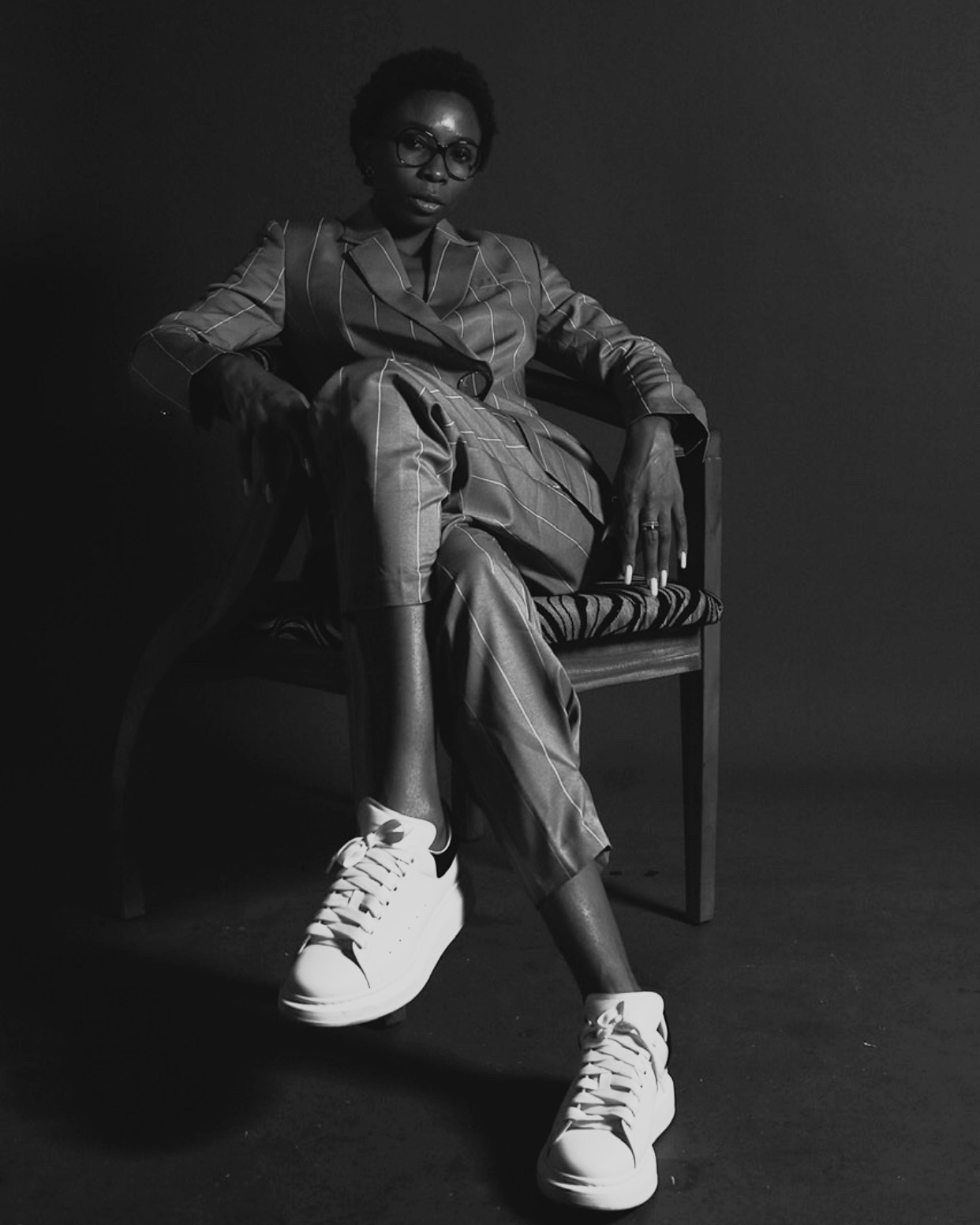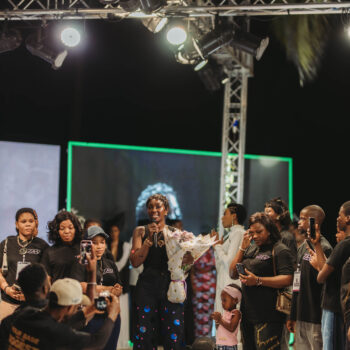Written by Edwin Okolo
There is no profession within the fashion industry that embodies its cutthroat nature quite like modelling. Except for a handful of supers, models across the world have a notoriously small window in which they are expected to build a career and garner international acclaim. Longevity is rare and as the world has evolved, so has the expectations of models, who are now required to be socially conscious yet approachable, to curate an impeccable social media presence that keeps them top of mind while maintaining enough distance to project an air of exotic inaccessibility. It is near impossible for models to survive without representation that brokers their deals, maintains their public personas and maps their careers. Bolajo’s success as Founder and CEO of Few Models comes from her understanding of the industry’s two cardinal truths, representation matters on and off the runway, and talent management is a business that can only be done right if sustainability and longevity are prioritized.
I believe in a certain type of close management, where every model we represent is happy with the terms of agreement we sign with them and our collective goal is to keep the model with strategic, successful castings.

Every agency has their strategy, and many sign on more models than they can handle in the hopes they can succeed by improving their averages. The agency relies on one-on-one management to form bonds with the girls they represent and better communicate their unique needs and proficiencies. The culture at Few Models is to keep the roster lean, and only represent 30 – 55 models in any calendar. That gives them the freedom to adequately prepare the models through their development academy for potential clients and ensure a higher average for placements and bookings. “We’ve been able to design a pattern of management for the girls we can take and we prioritize quality management over numbers.”
Finding the right agency for the right girl is delicate, time-consuming work. This is why Bolajo swears by development. Not every girl understands the fashion industry or the rights that models enjoy in more developed industries. Some girls come to the agency as blank slates who can be moulded through mentorships or education to become chameleonic models, useful for larger agencies with diverse clients. Other girls either have a distinct look or a singular perspective that only resonates with niche clients, and helping those girls find a balance between the client’s needs and their philosophies is work that must be done before they are introduced to agencies. Some girls are better off with a smaller agency and some girls do better in bigger agencies with large client rosters.
“As a model scout, you must understand that your top priority is never to jeopardize people’s lives. The things that are involved in scouting are very personal, sensitive and sentimental. You have to consider that. ”
The consequences of not taking this crucial stage seriously are dire. In situations where a girl is not comfortable with her secondary agency or struggles to find fulfilling work, it falls to the mother agency to renegotiate a contract for the girl or pull her out from the agency. These extractions are rarely painless, and early mistakes have refined Bolajo’s process and impressed on her importance of finding a balance between working for the best interest of the model and the agency. This is also why the agency devotes a disproportionate amount of time towards the model development process and only begins to shop for agencies for models when it is sure that the model is fully equipped to navigate the cultural demands of working in a global fashion market. The work is gruelling but deeply satisfying but the metrics of success extend beyond monetary success.
FASHION IS BIGGER THAN THE RUNWAY
Only by looking at where she’s come from do you get a proper scope of how hard Bolajo Fawehinmi worked to make her way here. A second generation academic from the famed Fawehinmi family (she is the daughter of Honourable Justice Rasheed Fawehinmi), she attended the Obafemi Awolowo University, majoring in Accounting and competing professionally as a sprinter running the women’s 200m, 400m and women’s 4 x 100 relays. Fashion for Bolajo wasn’t originally a priority. She only started to explore options outside of professional sports when her father forbade her from pursuing a career in law because she felt she was too assertive and would quickly amass enemies. A desire to fill the void was why she entertained a scout who discovered her during a game and brought her to Lagos to try her hand at modelling.
It took two years of experimentation, including a run in the 2011 Miss Nigeria Pageant where she was crowned Miss Congeniality before she got her big break walking in the 2012 edition of the now-defunct Music Meets Runway showcase. It was fun for a while, but the industry felt rigged for all but a small percentage of models, it was only a matter of time before she chose to pivot.
“I should have left in 2015,” She says of her last season as a professional model, “but several designers with whom I had built relationships approached me directly to walk in their shows and it made more sense to just be a part of the system instead of an exclusive.”
She had known for quite some time that her focus had shifted from the whirlwind of activity around fashion season to the mechanics that kept the industry running. Armed with that knowledge, her background in accounting and her waning interest in runway, she began to plot her pivot into talent management. The next year she would convince the management behind the Jaguar Lagos Fashion Awards to cast Ifeoma Nwobu, a new face who had never worked professionally to front their fashion. The success of that campaign was a confirmation of her confidence as a scout and the ambition she was bringing to the business.
 “Most models tend to work until circumstances prevent them from working but I didn’t want that
“Most models tend to work until circumstances prevent them from working but I didn’t want that
for me. I was one of the first models to ‘quit’ modelling, not officially but I made sure relevant people in the industry knew I was no longer available for runway and editorial work. I used those opportunities to begin to promote my agency.” As a young scout, still figuring out what kind of agency she wanted to build, Bolajo would leverage her connections as a former model to attend international weeks to get a sense of what the international casting process was like and what the trends portended for models. It was during one of those fashion weeks that she was approached by the vice-president of IMG Models during a visit to Milan Fashion Week. The vice president of IMG, Jeni Rose called the agency’s Nigerian office to inquire about a model under development. They were redirected to Bolajo’s hotel in Milan, and formal introductions were made. But that first conversation led to several conversations with IMG international’s global leadership to see if the agency’s goals aligned with the values of IMG and a formal partnership was signed.
“I consider it one of the most zeniths of my career as a scout,” she tells me, “to be ‘scouted’ myself for my exemplary work behind the scenes.” In an industry where even established brands struggle to make meaningful connections, these moments of serendipity met with thorough preparation have allowed Bolajo Fawehinmi to build a formidable reputation as a scout and a talent manager. When she started her career in fashion as a runway model, not many of the industry insiders that she worked with on her first season could have foreseen that she would reject the gatekeeping that has stagnated the industry and allowed only a small cache of players to benefit from its opportunities. But Fawehinmi has spent the last decade correcting assumptions about her intuition, her business acumen and her encyclopaedic understanding of talent representation and how it interfaces with the fashion ecosystem.
FASHION IS A CUT-THROAT BUSINESS, BUT ONLY TEAM PLAYERS THRIVE
Fashion is a passion-driven industry and many insiders allow that passion to drive their businesses, often forgetting that the business is also one of extreme risk. Bolajo draws on her background in finance to test her ideas for merit before implementing them. She assesses risk by gathering facts on the industry and testing her ideas against the available information on what strategies have been successful or not. This strategy has informed her decision to run her smaller, more immersive business and informs her entire business model, from scouting to casting.
Bolajo lights up when we segue into the stereotypes around who qualifies as a model. As a scout who runs an agency, she has had to deal with all kinds of unrealistic expectations from models and their families who consider ‘runway’ as the only yardstick for relevance as a model. The industry serves several diverse audience demographics, all of whom are demanding representation in the campaigns and ads targeted at them.
“When people say, ‘she is just an Instagram model’ she’s not a model. I always ask them, ‘Does she market anything?’, ‘Has she been able to influence your decision making on any product’? If the answer to either of these questions is yes, then she is a model.”
Even in fashion modelling, being on the runway is not quite a yardstick for professional success. Bolajo admits it is necessary to define the career of fashion models, but models can also excel through editorial work in print and audiovisual media. To meet this need, the agency is expanding into new divisions with Few Visionary and Few Curve to provide representation for non-conventional models. She explains that runway should be considered a specific kind of achievement for a model, and an exclusive with a storied fashion house like Fendi, Prada, Louis Vuitton or Margiela can define a fashion model’s career much like working with the right director can greatly improve an actor’s place in the entertainment industry. “I don’t think a lot of girls understand this, so they do desperate things to get the coveted runway slot, undercutting themselves and sabotaging the industry as a whole just to have runway work on their portfolio.”
She has also had to deal with the industry-wide devaluation of models by clients and the models themselves. It was a problem she dealt with as a model and one that has become a more urgent concern for her now that she is the one tasked with negotiating fair wages for models. She understands the delicate balance that allows this injustice to persist and acknowledges her limitations in reversing this phenomenon. But Few Models is a business built for sustainability, and Bolajo feels she still has time to replicate the sustainability she has introduced into her business to the modelling industry as a whole. I ask Bolajo about her experiences with the much-discussed discrimination within the industry. Her answer is controversial in the age of political correctness, but it is one that she is quick to qualify as a personal motto, not an examination of the industry as a whole. “Even as a child, I have believed it was a misdirection of energies to try to solve structural problems that stem from race and gender or ethnicity. I have trained myself to not dwell on discrimination of any kind. This mindset served me well as a model and continues to influence my reactions as a manager.”
That mindset serves her even now, allowing her to focus only on the goal of helping her models attain the highest levels of success within the industry. That doesn’t mean she doesn’t acknowledge what she considers injustices against her brand or her models; it just means that she can address perceived slights free of subtext and move on once a solution that satisfies her is reached. This mindset is also why she did not bother with media unless it is to promote her brand or her clients.
“As a business owner, I am content to let things unfold and have people come to their conclusions on business matters that somehow make their way to the public. My job is to ensure that all legal expectations are met and leave public opinion to the public.” Experience has proven no matter how careful she is, there are some decisions she must make that come with collateral damage for herself and others. Every successful scouting is a person who places at least a year of their lives in her hands on the unspoken agreement that the sacrifice will be the service of a personal dream. With such high stakes, Bolajo is extra careful before she commits to any one of those decisions was the shuttering of the agency’s male division. A moderate success at the time of its closure, the agency realised there was simply not enough challenging work for male models in Nigeria to justify the gruelling development schedule needed to transition into international agencies. After consulting with her mentors and business advisors and processing some unflattering feedback about her capacity to manage male-only talent management divisions and discussing extensively with the team of scouts and administrative personnel she bonded within the years since she started the agency, it became obvious to her that while financially lucrative, the venture would prove unsustainable in the long term.
“It was a long process for me to get to that point, and it was a decision that had to be made because I have always been focused on sustainability as the foundational principle for Few as an agency.” She tells me she has no regrets about walking away from male model management. She still scouts male models and introduces them to agencies that have shown better proficiency in managing male models sustainability. This idea of sustainability is also why she doesn’t dwell on the phenomenal success Few Models has enjoyed in the last half-decade. She tries to find a healthy balance between focusing on the future trajectory of Few and its career milestones, as a way to keep momentum.
“There’s always a wow factor when people look back and assess the progress they’ve made in their careers, but if you allow yourself to be overwhelmed by the work you’ve already done, you’ll lose the drive to pursue the career highs that lie ahead.” In the meantime, Bolajo occupies her time with executing her ideas for global expansion. The agency’s most popular platform Few’s Next Face was conceptualized in 2017 as a vehicle to increase the agency’s chances of scouting the best models on the continent. The strength of the ideas behind the competition was so exciting, IMG Models asked to partner with Few to provide representation for the models scouted from the competition. Few’s Next Face has grown to accommodate models across the continent and in the diaspora and will scout on two continents for its third edition.
 With sufficient structure in place, Bolajo has replicated the Few Models business model with plans to expand in Africa to deal with continental representation for her models. Few has also opened a New York office to serve Africans in the diaspora. The New York office has just scouted and placed its first model. Next Face scouted successful models like Daberechi Ukoha- Kalu, Eniola Aboro and Dotain Asfawosen who have found success in the international market as runway and editorial models.
With sufficient structure in place, Bolajo has replicated the Few Models business model with plans to expand in Africa to deal with continental representation for her models. Few has also opened a New York office to serve Africans in the diaspora. The New York office has just scouted and placed its first model. Next Face scouted successful models like Daberechi Ukoha- Kalu, Eniola Aboro and Dotain Asfawosen who have found success in the international market as runway and editorial models.
Her plan for the next decade is to diversify the agency’s portfolio to profit off growing niches within the industry. She started Few Impact, a non-profit that gives back to the communities in Ondo and Lagos states that raised her and played a significant part in her development, with a focus on education and prison rehabilitation. She is also expanding the Few Next Face to accommodate Africans in the diaspora. Her next real passion project however is connecting international talent management agencies with African influencer talent. Africa is the next big frontier for technology, fashion and entertainment industries and the internet has allowed the consumers on the continent to express their very vocal demands for appropriate representation in the media and content businesses want them to consume. She intends to do this through her talent scouting agency Few Visionary, the company’s new venture. Bolajo is quick to remind me that the new business venture is very different structurally from her talent management agency. Its primary focus is ‘scouting’ (a word she uses very loosely) influencers who already have a vibrant media presence and have successfully led campaigns in varying creative fields. She intends to essentially provide them with the tools to reposition their brands to attract global clients while still focusing on converting attention to revenue within the African market. Once the connection between a Few Visionary and international talent management agency is made, Few stays on as the mother agency; protecting the interests of the talent. The agency will most likely make its commissions for successful placements and stay successful by keeping its roster small. It is a serious undertaking, but Bolajo believes the time is right to finally allow the agency to try its hand at bringing the necessary structure and representation required to solve another dysfunctional but potentially lucrative market in Africa. This is the gap she understands best and has the appropriate tools to bridge.
“As an entrepreneur, you can’t bridge all the gaps, you just have to bridge a particular gap and create a system that allows you to continue to profit off addressing that gap.”




